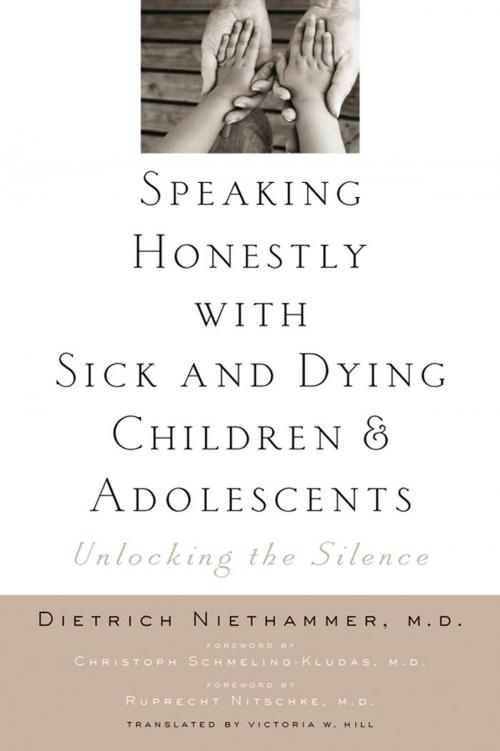Speaking Honestly with Sick and Dying Children and Adolescents
Unlocking the Silence
Nonfiction, Health & Well Being, Medical, Reference, Ethics, Education & Training| Author: | Dietrich Niethammer, MD | ISBN: | 9781421405360 |
| Publisher: | Johns Hopkins University Press | Publication: | June 1, 2012 |
| Imprint: | Language: | English |
| Author: | Dietrich Niethammer, MD |
| ISBN: | 9781421405360 |
| Publisher: | Johns Hopkins University Press |
| Publication: | June 1, 2012 |
| Imprint: | |
| Language: | English |
Talking openly with sick and dying children about their illness is always difficult and often agonizing. It is honesty, however, that these children deserve and need. Dietrich Niethammer, a prominent pediatric oncologist, explains why it is so important to speak frankly and respectfully to young patients about their disease.
The question at the heart of this book is how children and adolescents feel and think about death and dying. Dr. Niethammer thoroughly examines the literature on the topic, arguing that children and adolescents not only are capable of discussing their illness but benefit from doing so. Puzzled why it took medical practitioners so long to accept truth-telling in their care of dying children, Niethammer traces the development of this notion from the early twentieth-century work of Sigmund Freud to the discomfort surrounding it still today.
Severely sick children and adolescents think about the consequences of their disease, whether adults discuss it with them or not. When adults remain silent, they do a disservice to the children. Dr. Niethammer urges doctors to practice not in silence and denial but in open communication with ill children, giving the children an opportunity to express their fears and anxieties and to cope with their disease on their own terms.
Dr. Niethammer's compelling personal experiences combined with the latest research make this a compassionate and invaluable resource for physicians, nurses, social workers, teachers, parents—for all who care for sick and dying children and adolescents.
Talking openly with sick and dying children about their illness is always difficult and often agonizing. It is honesty, however, that these children deserve and need. Dietrich Niethammer, a prominent pediatric oncologist, explains why it is so important to speak frankly and respectfully to young patients about their disease.
The question at the heart of this book is how children and adolescents feel and think about death and dying. Dr. Niethammer thoroughly examines the literature on the topic, arguing that children and adolescents not only are capable of discussing their illness but benefit from doing so. Puzzled why it took medical practitioners so long to accept truth-telling in their care of dying children, Niethammer traces the development of this notion from the early twentieth-century work of Sigmund Freud to the discomfort surrounding it still today.
Severely sick children and adolescents think about the consequences of their disease, whether adults discuss it with them or not. When adults remain silent, they do a disservice to the children. Dr. Niethammer urges doctors to practice not in silence and denial but in open communication with ill children, giving the children an opportunity to express their fears and anxieties and to cope with their disease on their own terms.
Dr. Niethammer's compelling personal experiences combined with the latest research make this a compassionate and invaluable resource for physicians, nurses, social workers, teachers, parents—for all who care for sick and dying children and adolescents.















